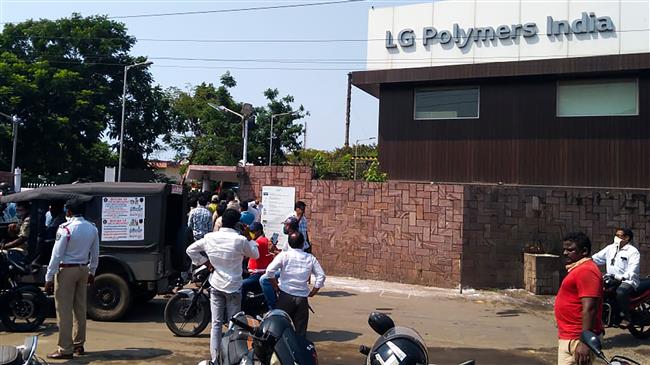Scores of workers arrested for protesting food poisoning at India's Apple plant
Indian police have arrested scores of workers protesting food poisoning at a Foxconn unit producing iPhones for the American tech giant Apple.
More than 250 workers at Foxconn India unit in Sriperumbudur on the outskirts of the southern city of Chennai, which makes iPhones for Apple Inc, were taken ill last week, prompting protests and demands for better labor conditions.
"Nearly 70 women and 22 men have been detained since Saturday for blocking the highway," a police official said on Sunday.
A statement from the Thiruvallur district administration on Saturday confirmed the food-poisoning incident at the Apple iPhone production plant.
"There was an outbreak of acute diarrhoeal disease reported among the Foxconn employees," said the statement.
It added that 159 workers had been hospitalized for food poisoning, of whom 155 were discharged. The rest of the factory workers affected by food poisoning had all received outpatient treatment.
Unofficial reports on social media put the number of victims at 700, claiming six women, who were reportedly Taiwanese, had died.
About 700 women working in a hotel in a private factory (Foxconn) in Sriperumbudur were admitted to hospital due to food poisoning while eating in the canteen yesterday. Today 6 women have died. This is being covered up without being shown by any media.😨#foxconn #7NEWS #Share pic.twitter.com/KOTphu9Bt1
— Raghulmersal (@raghulmersal) December 18, 2021
Foxconn did not immediately respond to a media request for comment about the incident at the Apple iPhone unit.
In December 1984, India witnessed one of the worst industrial disasters in history when gas leaked from a plant owned by the Indian subsidiary of the American firm Union Carbide Corporation -- a major US manufacturer of chemicals, petrochemicals, and related products such as pesticides-- in the central city of Bhopal.
Around 3,500 people, mainly in shanties around the plant, died in the days that followed and thousands more in the following years.
To this day, people continue to suffer the after-effects of the disaster. Government stats say that at least 100,000 people living near the pesticide plant have been victims of chronic disease.
The Bhopal victims still suffer from ailments such as respiratory and kidney illnesses, hormonal imbalances, mental disorders, as well as several forms of cancer.
Present generations have been made sick by the polluted groundwater there and poisonous milk breastfed to them from birth by their affected mothers.
Children are still born disfigured with webbed hands and feet, weak immune systems, growth disorders, and congenital disease.
South Korean President Yoon arrested over failed martial law bid
VIDEO | Press TV's news headlines
US budget deficit surges to record $711 billion
VIDEO | Yemeni army conducts three attacks against Israel within 12 hours
VIDEO | Gaza’s kidney patients face imminent death amid lack of fuel
Yemeni drones hit targets in Israel-occupied Yaffa
VIDEO | Is the worst yet to come?
ICC prosecutor pushes rejection of appeal on Netanyahu arrest warrant











 This makes it easy to access the Press TV website
This makes it easy to access the Press TV website